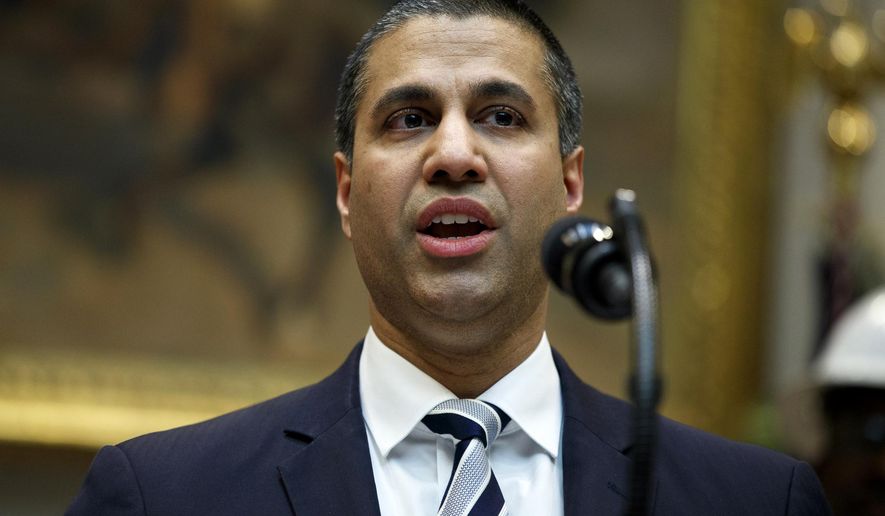OPINION:
The proposed merger between Sprint and T-Mobile has for months been dangling in all directions, waiting for Washington — like a Roman emperor — to point its thumb north or south. At times it looked as if the merger were a sure thing, assuming certain concessions were made. Then whispers arose that the two agencies crucial to the merger’s approval, the Federal Communications Commission (FCC) and Department of Justice (DOJ) had “concerns.”
Half of those concerns were put to rest this week when FCC Chairman Ajit Pai gave the thumbs-up for the merger, stating his belief it would serve the public interest and that he will encourage his fellow commissioners to vote in favor. With one commissioner already on-board and another heavily leaning toward approval, Mr. Pai’s announcement all but signaled that the FCC won’t be the one to stand in the way of New T-Mobile.
If any champagne corks were about to pop in T-Mobile’s Bellevue, Washington headquarters, they were quickly holstered on a Bloomberg report the same morning from a source familiar with the DOJ’s review process that suggested the merger faces an uphill climb. That story was blunted by a Fox report that DOJ insiders were more positive, highlighting once again the deal’s fate is anyone’s guess. As the roulette wheel continues to spin, all eyes are now squarely focused on DOJ’s head of antitrust, Makan Delrahim, who holds center stage.
The $26 billion merger proposal has spent over a year being poked and prodded by numerous federal and state agencies, with the respective CEOs of each company submitting over one million pages of documents and testifying repeatedly at congressional hearings. But unlike previous administrations, Mr. Trump’s appointees deserve praise for acting with due diligence, and rendering decisions before their shot clocks expire.
To date the most noteworthy opponents of the merger have been a bought-and-paid-for union and a segment of rural carriers who fret that a changing wireless landscape will undermine their favorable leasing deals. The sound of their dissent, however, remains a mere squeak in the dark in comparison to the voluminous benefits the merger promises for consumers and our nation as a whole.
It’s no secret that winning the race to 5G is paramount for America to maintain our leadership in global technology; it’s beyond critical that the tech that will serve as the foundation of our economy for the next generation not be outsourced from China or South Korea. The Sprint, T-Mobile merger aids and abets this mission by generating $40 billion of 5G investment, to develop proprietary technologies and build out a coast-to-coast network that will speed 5G to our nation and consumers faster. Coming in second is not an option, and this merger helps America win.
The objection that the merger reduces competition in the marketplace is especially absurd. As separate companies, Sprint and T-Mobile will remain marginal wireless players, but joined as one will have the scale, resources and spectrum to challenge the current duopoly of Verizon and AT&T. A third nationwide carrier will create more competition, which will result in lower prices and more services for consumers and U.S. businesses.
Merging further eliminates the redundancy of the enormous fixed costs of creating a 5G network, leading to a savings dividend that will be passed on to customers. T-Mobile has already staked its brand as the “un-carrier” that tilts at the status quo, taking special aim at the dominant companies, each of which will still have millions more subscribers than New T-Mobile. Continued price competition is all but guaranteed by the simple reality that it would make zero sense to spend billions to challenge the Big Two wireless companies and then throw your business model overboard.
Speculating on market competition is further difficult for industry experts, let alone government. Opponents of the proposed merger between Blockbuster and Hollywood Video had “concerns” regarding market competition, but none of them saw Netflix on the horizon. And so it is with tech today, nobody can predict how the market will reshape as technologies continue to develop rapidly, least of all bureaucrats staring at charts. Other companies are already changing the wireless market dynamic through expansion, such as Comcast, Charter, and Dish Network, all of which have access to spectrum. Market competition, it turns out, will be just fine.
Mr. Pai noted the FCC’s two top priorities are winning the race to 5G and closing the digital divide with rural America. With the former already addressed, it’s important to note that 62 million rural Americans are among those who stand to gain the most from the merger in terms of a wireless upgrade, as current 4G LTE technology remains wholly inadequate in far too many of our less densely populated counties and towns.
Already suffering from slower and less reliable service due to geography, poor connectivity is also spurring a population drain, among young people especially. Rural America needs 5G desperately, and T-Mobile CEO John Legere has made assurances with Pai and others that the merged company’s new network will cover over 90 percent of rural America with high-speed wireless within three years, a major step forward in closing the rural digital divide.
It is projected that 5G will produce $500 billion in added GDP and create over 3 million new jobs within a few short years. It will close massive holes in America’s rural coverage map and secure our nation’s position as the global leader in digital technology for at least a generation. By every measure, the Sprint, T-Mobile merger has proven it checks all of the boxes in support of these national priorities, to the benefit of consumers, rural Americans, job creation, our overall economy, and America’s position as the global leader in digital technology. Washington’s final decision should be an easy one.
• Gerard Scimeca is a lawyer and vice president of CASE, Consumer Action for a Strong Economy.




Please read our comment policy before commenting.